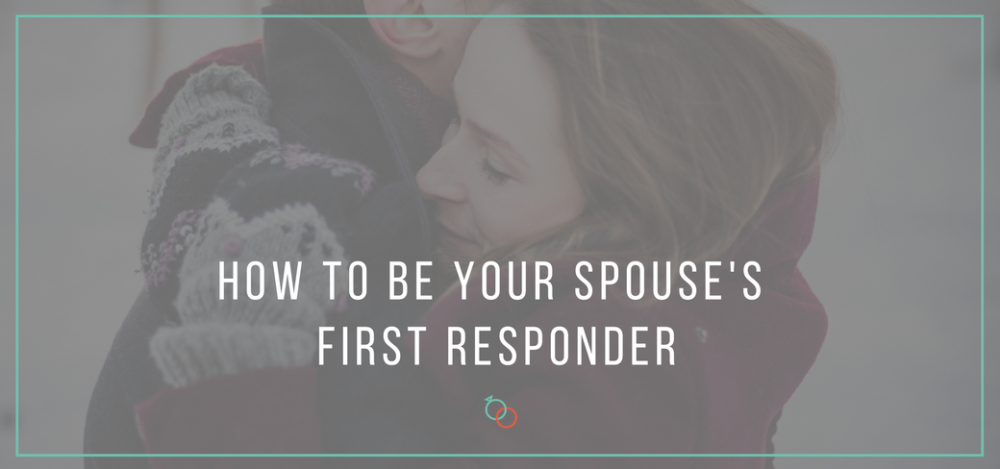How To Be Your Spouse's First Responder
By Amy Miller
Last month, I read an article about parents needing to be their child’s “first responder” in a crisis. What they meant is that the first reaction shouldn’t be to yell at them for the situation, but instead, you should first help them.
I can absolutely attest that this concept works because my parents did this for me as a teenager. Since I have always loved this concept, I applied this idea to marriage, of course!
Marriage Crises
In marriage, we can face all varieties of a crisis at any time, typically very unexpected, too! Some typical crises couples face: financial stresses, car accident, children behaving badly, lifestyle habits, physical or emotional health, moral dilemmas, etc. etc. And when we face these situations, it’s imperative that we be supportive and helpful through it all.
When it comes to being a first responder for your spouse in any crisis, I believe it all comes down to two things: feelings of safety, and the right reaction. Your first priority should be your spouse’s safety. And your first reaction determines how safe your spouse feels.
I’m going to talk about 3 steps for how you can be a better first responder for your spouse that utilize these two key areas.
What an emergency first responder does
In order to discuss how you can improve at being a first responder to your spouse, I think it gives more perspective to look at what emergency first responders do:
- They are the first to arrive at a scene
- And they assist victims until further help arrives like the paramedics
- They know how to assess injuries and focus on caring for those immediate wounds
Just like police officers, EMT’s, and firefighters, these are 3 major things that a spouse should do first in any kind of crisis situation in marriage**!** I’ve put these in marriage terms in three specific steps below, with suggestions for each step, but please refer to the sections on safety and reactions to give more understanding to each of these steps and WHY you should or shouldn’t do certain things.

1. Ask if your spouse is OK
- Help your spouse feel more safety emotionally and physically by asking what you can do to help, or even saying, “It sounds like the situation you are in is chaotic right now and I think you’d feel better being in the comfort of your own home, so let’s focus on getting you home, first.
- Assess any injuries through consoling comfort and validating the stress and/or harm they are feeling.
- If you can’t be physically present, be there for them emotionally as much as you can.
2. Let them explain what happened.
- No matter the situation or who looks at fault, things might not appear as they seem.
- Letting them vent their thoughts can help them process it, especially if they are in shock.
3. React appropriately and at the right time.
- Wait until you are in the right setting to discuss the situation further, such as in private instead of in front of people, especially children.
- Balance their feelings and current needs vs. what you want to say to them. Like if your spouse has made a mistake and feels horrible about it, kicking them while they are down can make the situation worse.
[caption id=“attachment_6687” align=“aligncenter” width=“700”] by nicholette photography[/caption]
by nicholette photography[/caption]
SAFETY
In discussing safety, I first want to remind us all of the old adage: “assumptions make an a** of U and me” haha. And those spouses who choose to yell at their spouse first before fully understanding the situation can definitely make themselves look like that, haha. How do you know what role your spouse played in the situation if you haven’t even asked them that yet?!
Sadly, many spouses ignore this logic by jumping to conclusions before understanding the situation, sometimes even blaming their spouse. They yell things like: “I can’t believe you did that after we decided you wouldn’t!” or “What were you doing there in the first place?!” or “Gosh, I told you that would happen!”
And you know what happens to the spouse getting yelled at? They don’t feel safe coming to their spouse for help in the future. And if this is a recurring situation, it can create feelings of insecurity and inferiority. And we all know that marriage SHOULD NOT be imbalanced like that.
REACTIONS
There is a time where the both of you should discuss the situation more in-depth because you want to prevent it from happening again, whether it was anyone’s fault or not. But that is not the first thing you should do. A good first reaction is letting your spouse know how glad you are that they are OK, or that they came to you about the situation.
I know a common concern about this is, “Well they did something really stupid, and I want them to know that it’s frustrating to me!” My response to that is you will have your chance to express how you’re feelings about the situation, but there is a time and place for everything.
Think about it this way: you go to the emergency room because you have a heart attack, the ER doctor isn’t going to stop the stretcher in the hallway to scold you for building up plaque in your arteries! The first thing he’ll do is relieve the pain to help you feel better! THEN when you’re done resting he’ll have a chat with you about the lifestyle changes you need to make to prevent another heart attack in the future.
The first thing your spouse needs is the care, the help, the listening ear, the protection, etc. Your first priority should be about their physical and emotional well-being, not trying to get the upper-hand or prove you were right.

So far in our short 4 years of being married, we have already had a few crises we’ve had to handle together, and we’ve done our best to create feelings of safety for each other in these vulnerable times, as well as tried to react in a way that’s helpful instead of hurtful. I know there are more situations like this to come, and I hope to better apply these principles when they do happen.
Whether or not you have already experienced a crisis like this yet, think about how you would do in one of these situations as you continue reading through this post. Think about ways that you can improve at being a better first responder to your spouse!
